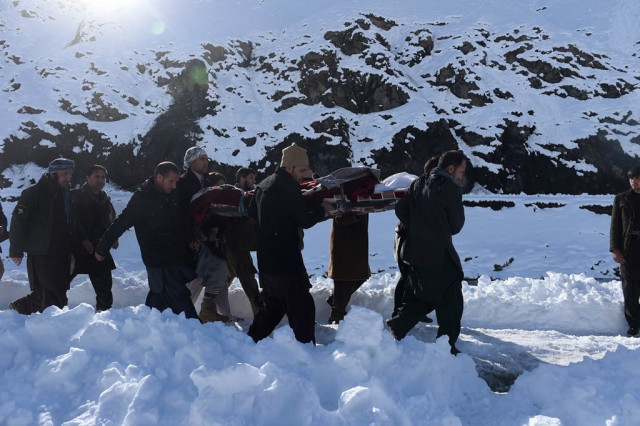Death toll from Afghan avalanches tops 200
Pakistan has expressed sorrow over the incident, extends relief assistance for the victims

Afghan men carry the body of a victim of avalanches after funeral prayers in Khench district of Panjshir province, north of Kabul on February 26, 2015. PHOTO: AFP
The bulk of the deaths came in Panjshir province, north of Kabul, where at least 168 people were killed, acting provincial governor Abdul Rahman Kabiri told AFP.
The avalanches came after days of heavy snow, which destroyed more than 100 homes in the province and blocked main roads, making it difficult for rescue workers to reach the stricken villages.
"Our death toll has risen to 168 people killed in avalanches in Panjshir province," Kabiri said, warning that the figure may rise in the coming hours.
"We have not seen this much snow in Panjshir, or this many avalanches, for decades," Kabiri added.
Elsewhere, 18 died in the remote northeastern province of Badakhshan and 12 in Nuristan province in the north. Six were killed in the central province of Bamiyan, four in Laghman and one in Nangarhar, both in the east -- bringing the total toll to at least 209.
Rescue teams are still working to recover dead bodies and survivors trapped in Panjshir, but deep snow has hampered efforts to reach isolated villages.
Funerals for the victims began on Thursday afternoon in the Panjshir village of Khinj, north of Bazarak, the province's main town.
Two helicopters have brought relief aid to Panjshir from Kabul, and distributed it among the affected families, but supplies were limited.
Much of the digging was being done by shovel or even bare hands, Kabiri said, though an AFP photographer saw mechanical diggers at work in several places in Panjshir.
Abdul Rahman Kalantari, head of disaster response at the Afghan Red Crescent Society, confirmed the Panjshir death toll and told AFP it was likely to rise.
President Ashraf Ghani expressed his sorrow at the deaths in a statement late Wednesday and said he had ordered Afghan authorities to provide urgent assistance to those affected.
Pakistan expressed sympathy and condolence over the deaths. According to a statement released by the ministry of foreign affairs, Pakistan was ready to "extend all possible relief assistance for the victims of this natural disaster-hit area."
Deadly avalanches are common in Afghanistan's mountainous areas in winter. One in the remote far northeast in 2012 left 145 people missing, presumed dead.
In 2010, another avalanche killed 165 people in the high-altitude Salang Pass, which runs through the Hindu Kush mountain range that connects capital Kabul to the north.
Large parts of the north of Afghanistan experienced heavy snowfall earlier this week.
Parts of Kabul were hit by power cuts after snowstorms and avalanches damaged power cables in the Salang Pass, which was closed to traffic on Wednesday.
Despite the billions of dollars in aid from the international community after the collapse of the Taliban in 2001, Afghanistan remains among the world's poorest nations after decades of conflict.
Rescue efforts after disasters such as avalanches and flash floods, which often hit as snows melt in the spring, are frequently hampered by lack of equipment.
Poor infrastructure makes it difficult for rescue teams to reach isolated areas.



















COMMENTS
Comments are moderated and generally will be posted if they are on-topic and not abusive.
For more information, please see our Comments FAQ